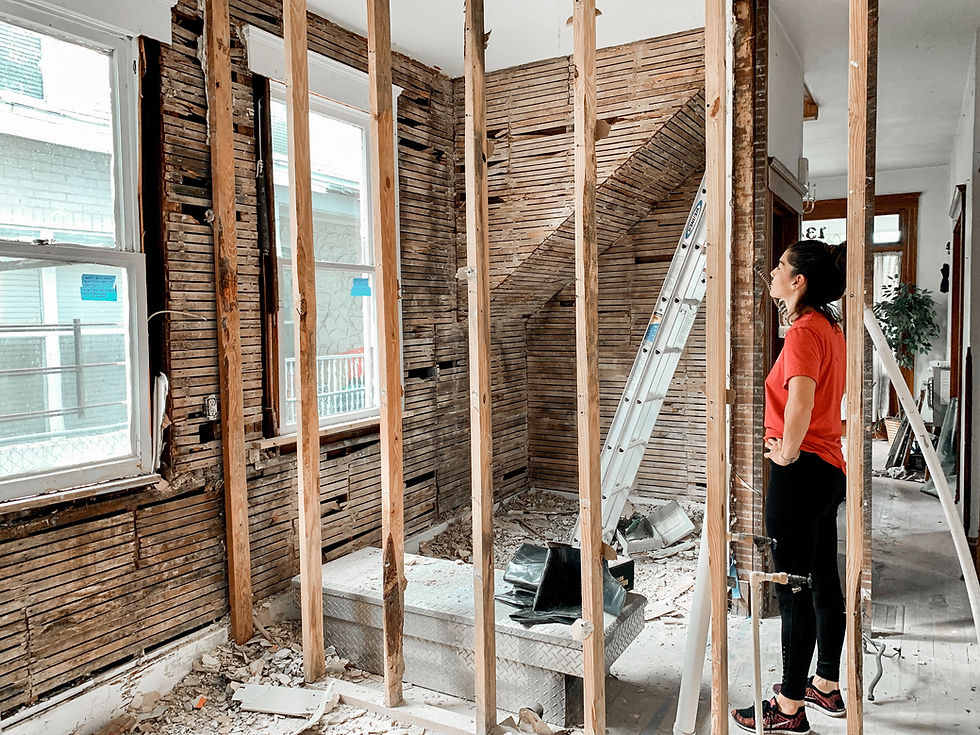Most Common Issues Found in a Home Inspection
- Astra Inspections

- Feb 19, 2023
- 4 min read
1- Roofing:
Here are some common roofing problems that a home inspection may discover:
Leaks: Leaks are one of the most common issues. They can be caused by a number of factors such as damaged or missing shingles, cracked flashing, or poorly installed roofing.
Hail Damage: Hailstorms can cause serious damage to a roof, including dented or cracked shingles, holes, and even structural damage.
Wind Damage: Strong winds can lift and damage shingles, causing them to become loose or dislodged from the roof.
Missing or damaged shingles: Missing or damaged shingles can result in leaks and other problems. Over time, shingles can also become worn and damaged due to exposure to the elements.
Poor ventilation: Proper ventilation is important for a healthy roof. Poor ventilation can cause moisture buildup, which can lead to mold and rot.
Bad installation: If your roof was not installed correctly, you may experience a variety of issues, including leaks and water damage.
It is important to address roofing problems promptly to prevent further damage and potentially costly repairs. Regular maintenance and inspections can also help to identify and prevent potential issues before they become bigger problems.
2- Electrical:
Here are some common electrical wiring issues that a home inspector might discover:
Faulty wiring: Faulty wiring is one of the most common electrical wiring issues. It can occur due to outdated or deteriorating wiring, improper installation, or damage from pests.
Short circuits: A short circuit occurs when an electrical current is allowed to flow along an unintended path. This can result in a loss of power, damage to appliances or devices, and potentially a fire hazard.
Ground faults: A ground fault occurs when an electrical current takes an unintended path to the ground, which can result in electrical shock, damage to appliances or devices, and potentially a fire hazard.
Improper grounding: Proper grounding is important for safety and to prevent electrical issues. Improper grounding can result in electrical shock, damage to appliances or devices, and potentially a fire hazard.
Incorrectly installed electrical outlets: Incorrectly installed electrical outlets can result in electrical shock, damage to appliances or devices, and potentially a fire hazard.
It is important to address electrical wiring issues promptly to prevent further damage and potentially hazardous situations. You should never attempt to fix electrical issues yourself, as it is one of the more dangerous areas of your house system.
3- Drainage and Grading
These are more typical grading and drainage issues a home inspection might discover:
Poor grading: Poor grading around the house can result in water pooling or running toward the foundation. This can lead to water damage, foundation damage, and potential structural issues.
Improper slope: The ground around the house should slope away from the foundation to prevent water from pooling near the house. If the slope is too flat or sloping towards the foundation, it can cause water to enter the basement or crawl space.
Clogged gutters: Clogged gutters can cause water to overflow and run down the side of the house, potentially causing damage to the siding, foundation, and landscaping.
Insufficient downspouts: Insufficient downspouts can result in water overflowing the gutters and even cause pooling around the foundation. It is important to have enough downspouts and that they are properly installed to direct water away from the house.
Damaged or missing drainage systems: Damaged or missing drainage systems, such as French drains or sump pumps, can cause water to accumulate around the foundation, resulting in water damage and structural issues.
Ineffective landscaping: Poor landscaping choices can contribute to drainage issues. For example, planting trees or bushes too close to the house can cause roots to damage the foundation and prevent proper water drainage.
It is important to address grading and drainage issues promptly to prevent further damage to your home. A professional landscaper or drainage specialist can provide guidance on how to correct these issues around your property.
4- Plumbing
These are some of the more common plumbing issues that a home inspection might expose:
Leaky faucets: A leaky faucet is one of the most common plumbing issues. It can waste a significant amount of water over time, increase your water bill, and even cause significant damage if not discovered in time.
Clogged drains: Clogged drains can occur in sinks, toilets, and showers. They can be caused by a variety of factors, including hair, food particles, and other debris.
Running toilets: A running toilet can waste a significant amount of water and increase your water bill. It can be caused by a variety of factors, including a faulty flapper, chain, or fill valve.
Low water pressure: Low water pressure can be caused by a variety of factors, including a clogged faucet aerator, a broken pipe, or a malfunctioning water pressure regulator.
Water heater issues: Water heaters can experience a variety of issues, including leaks, a lack of hot water, and mineral buildup. These can result in reduced efficiency and potentially require costly repairs.
Sewer line issues: Sewer line issues can result in backups and slow drains. They can be caused by a variety of factors, including tree root intrusion, pipe deterioration, and clogs, among other things.
When discovered, these problem areas should be addressed promptly to prevent further damage and potential health hazards. A licensed plumber can provide guidance on how to correct these issues around your home.
In summary, a home inspection can provide valuable information that can help you save money in the short and long term. By identifying hidden issues, negotiating repairs or prices, planning for future maintenance, and prioritizing repairs, you can make informed decisions about the home and potentially save yourself significant amounts of money.




Comments